|
The last full week of Lent, before Holy Week begins, has always been a bit of a struggle for me. Usually by this time, I’ve already slipped up on my voluntary Lenten penances once or several times, I’m ready for the Triduum to just be here already, and I’m completely over the color purple. My husband and I jokingly call this spiritual sluggishness or restlessness “the end-of-Lent slog.” It seems like these particular days before Holy Week ramps up are when we are tempted the most to go back to the things we’re fasting from or to just throw in the towel on Lent because we’re “basically done.” My husband and I pray Evening Prayer from the Liturgy of the Hours together, and one of the readings that has resonated with me this Lent comes from St. Paul. In his first letter to the Corinthians, he encourages his readers to imitate well-trained athletes and to “run so as to win.” He continues: “Every athlete exercises discipline in every way. They do it to win a perishable crown, but we an imperishable one.” When I was a teenager, I viewed Lent as a sprint: choose some really intense or difficult penances, struggle to maintain an unrealistically high level of spiritual rigor, and then after Easter gleefully go right back to doing and eating all the things I had given up while tossing out all the spiritual growth I’d supposedly just undergone. As I matured in my faith, I came to understand that Lent is not meant to be a temporary, intense lifestyle challenge; rather, it is the start of a marathon. It’s a specific time to motivate ourselves to grow deeper in our relationship with God by letting go of the things that keep us from Him and by doing more difficult penances for our sins and vices—preferably by abstaining from them and thus breaking our addictions to or reliance on them. Like St. Paul says, we ought to treat our spiritual lives the way that athletes treat their sport: they dedicate themselves to it, setting higher and higher goals, training their bodies, denying themselves in order to maintain peak physical performance. And all of this to win a crown of leaves! How much more important, then, are the things we take on during Lent? We are training and preparing our souls for an eternity in Heaven with God, not for gold medals or accolades here on earth. Do we approach Lent as something that we need to win right now, this year? Or as something that trains us and jumpstarts us for the rest of the year—and the rest of our lives? Do we find ourselves fasting from the same things every year because we couldn’t maintain virtuous habits once the Easter bells started to ring? Or have our old Lenten penances and prayers become so incorporated into our daily lives that we can build upon them with each new Lenten season? Once I realized these things about Lent, all those times I “failed” in my Lenten practices didn’t seem so terrible anymore. I no longer want to “quit” Lent when I accidentally slip up on my penances or when I find myself giving in to temptation. If Lent is meant to jumpstart us on spiritual practices that we continue for months and years afterward, then we have to acknowledge and move past the stumbles and crashes when they come. Our failures to live up to our promises to God are still regrettable, certainly, but when we are in it for the long haul, our stumbles are also much more forgettable. St. Paul shows us that in “forgetting what lies behind but straining forward to what lies ahead” we must continue in our “pursuit toward the goal, the prize of God’s upward calling, in Christ Jesus.” We must acknowledge and repent of our broken pasts and our sinfulness, but we also must look with hope toward the future that Christ has made possible for us. If we allow ourselves to dwell too much on our failures, our concupiscence, our weakness as mortal men, then we can lose sight of the ultimate goal for which we strive: to be with Christ in Heaven. As Lent moves into Holy Week and Eastertide, let us strive to be like Paul’s well-disciplined athletes, winning the marathon of life by training our souls for the eternal prize of Jesus Christ. For more resources to accompany you throughout the Lenten season, please click here. Question for Reflection: How can you build on your Lenten practices throughout the liturgical year?
0 Comments
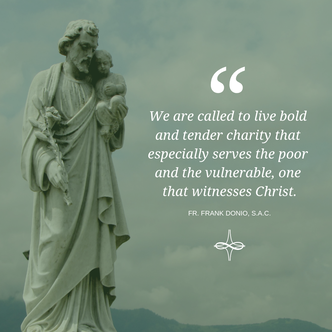 March 19th marks the Solemnity of St. Joseph, Spouse of the Blessed Virgin Mary and Patron of the Universal Church. These are rather lofty titles. He has many others. I first came to know St. Joseph, not only through the Nativity story, but because he was the patron of my parish church in Hammonton, New Jersey. As a child, I would look at the statue of St. Joseph to the right of the main altar and saw a wise looking, older person holding the child Jesus. His face was kind and tender, yet strong. Only later did I admire the work of the artist who was able to capture the essence of St. Joseph. Pope Francis, whose sixth anniversary of the inauguration of his ministry as pope is also on March 19th, reflected on these and other aspects of St. Joseph and what they mean for us: “In the Gospels, Saint Joseph appears as a strong and courageous man, a working man, yet in his heart we see great tenderness, which is not the virtue of the weak but rather a sign of strength of spirit and a capacity for concern, for compassion, for genuine openness to others, for love. We must not be afraid of goodness, of tenderness!” (Pope Francis, Homily, March 19, 2013) Charity or love, St. Thomas Aquinas tells us is “to will the good of the other.” (CCC, 1766). Goodness is not simply about being polite. It is much more than that. It is an opportunity to live love of neighbor in a way that is strong and bold at times. It is a way of showing love of God. Consider what St. Joseph did for Mary in taking her into his home (Mt. 1:24) or in moving the family to Egypt at a moment’s notice (Mt. 2:14). These were in response to God’s invitation to do so – an invitation that came in dreams. We are called to live bold and tender charity that especially serves the poor and the vulnerable, one that witnesses Christ. This is at the heart of the Lenten practice of almsgiving. It is this type of charity that “urges us on” as St. Paul tell us (2 Cor. 5:14). Pope Francis witnesses it, St. Vincent Pallotti lived it, and we are all called to do the same. May the Charity of Christ urge us on! The next forty days of Lent are Mother Church’s annual call to intense prayer, fasting, and almsgiving oriented towards embracing God as the center of one’s life and repenting of all which distracts us from Him. With the current crisis for the Church in the United States, it seems that the Church could really use a good spiritual renewal, cleansing, and renunciation of sin often focused on during the season of Lent. As parts of the Body of Christ[1], we are all too aware how an affliction experienced (or caused) by one part affects us all. Recall the words of St. Paul, “Rejoice with those who rejoice, weep with those who weep... Do not be conquered by evil but conquer evil with good.”[2] The Church is suffering but, just as she always has, she will ultimately be restored for the glory of God. As laity, you and I are key to addressing this scourge, along with the Church’s holy clergy and religious, and to affirming God’s presence in our lives not just in the Lenten season, but every day.
Though a time of repentance, Lent is not a time of despair or hopeless suffering; this season reminds us that God, although saddened by our repeated failings, never closes Himself off from offering mercy and love to the broken, the sinner, and the lost. Lent is not a diet, nor a fad of living without something trivial, nor even a temporary spiritual renewal; it must take root—free from the sin which prevents this—and be nourished over the coming weeks to strengthen us throughout the whole year. Above all, Lent prepares us for the celebration of Easter. Christ has died, Christ is risen, Christ will come again; the Church suffers, the Church is renewed, the Church shall be restored! The abuse scandal today may cause people to feel abandoned, angry, confused, and sad. “How can this be happening?” is certainly a question in our hearts and homes these days. It is important to remember that Jesus Christ, the same “yesterday, today, and forever,”[3] reigns over the Church. He is omnipotent, divinely good, and eternal; Let us take courage in the truth that our faith is ultimately in Jesus Christ. Because our Lord remains faithful to us[4] and ever close to His bride, the Church, He gives us the strength to recommit ourselves to renouncing the evil in our sight that threatens to drive us away from God and His Church. Lent is the perfect opportunity to facilitate spiritual renewal, not only for ourselves but also for the greater Church. Following the example of Jesus’ time in the desert before commencing His public ministry, the faithful are invited to reflect on the state of the Church, pray for strength, courage, justice, and healing, and even seek accountability in the governance of the Church. Personal penance can be made for our own failings, but reparation must also be made to address this scandal and to unify God’s people to prayerful and peaceful action in seeking God’s healing grace to move forward. Over the next 40 days, let us care for the Church by promoting healing among ourselves, supporting the afflicted and needy, addressing sin and divisions, and always proclaiming Christ to each other and the world. For more resources to accompany you throughout the Lenten season, please click here. [1] cf. Lumen Gentium, 33. [2] Romans 12:15, 21. [3] Hebrews 13:8. [4] cf. 2 Timothy 2:13. The authentic Christian life resounds with love. Beyond any fleeting attraction or fondness, this love is not meant to be hoarded, but to be given in charity and service to others. The love of a Christian reflects the love of God, without Whom we would not exist nor would we have the capacity to love beyond the other, lesser creatures of this planet. This love cannot be restricted to a single day on the calendar but is meant to flow freely every day at every hour through every difficulty and joy, every sorrow and labor, and every moment of pain and peace. It is love which motivates us not only to live for others, but always for the glory of God.
Normally, the marital love between a man and a woman manifests and literally takes on new life in the conception of a child. That child adds another wonderful dimension to the love of married life that encompasses parenthood. Years of teaching, correcting, protecting, caring for, playing with, cherishing, and feeding children are physical and emotional applications of love purposed with raising them as members of the domestic church. Eventually, the outpouring of parental love for children can be reciprocated by them in selfless acts of charity, gratitude, joy, or other expressions of affection. Think of the times your parents would beam at seeing your room tidy without asking, warmly embrace you, offer a surprise gift, or watch you shine at school or on the field. Similarly, the example of love shown between parents is not lost on children. This example imprints the strength of the sacrament of marriage—especially during times of difficulty or stress—and encourages children to better appreciate and actively participate in the love of family life. For example, chores or other labors may be done more freely as intrinsically valuable to the functioning of the domestic church; without love, children might only begrudgingly pick up after themselves when forced. How does love otherwise radiate through family life? The eyes which looked upon the spouse on the wedding day can continue to hold the same gaze of awe-filled love through later moments of despair or pain. The hands which exchanged wedding rings can embrace one another with tenderness, consolation, joy, or mercy. They can also be used in service to the poor, the lonely, or the dying. The lips which uttered sacred vows can impart wisdom, praise, blessings, or part in radiant smiles. Just as God lovingly created the human body down to the smallest detail as “good”, so too can the body we have been gifted be utilized to facilitate God’s love among loved ones and neighbors. Perhaps the first lesson your parents taught you was that God is love. By virtue of our baptism, we have become adopted sons and daughters of our Heavenly Father. As such, every answer to our prayers is entirely out of love, regardless of the result. Similarly, our parents, having been entrusted with caring for us, draw upon the love in their marriage to instruct, guide, nourish, or chastise. While our parents’ love may be imperfect, we can look upon the perfect example of the love of the Trinity to shape our applications of love to transcend human limitations. As St. Paul famously wrote, “love bears all things, believes all things, hopes all things, endures all things.” If it did not, how could any of us be forgiven for our sins against each other or God? How would salvation history exist without love? Authentic marriage or family life is not sustainable without love. And yet, our human limitations may restrict our application of love in certain circumstances. That is why love must be renewed. It must deepen over time to reflect the experiences of life and extend to others. Couples may go on date nights, retreats, vacations, or other activities which can foster relaxation and various communications of love. Similarly, we are reminded of God’s love at each Mass, in which recalling the ultimate Love on the cross helps us receive spiritual renewal to offer that same love to all we encounter. The spiritual renewal we attain allows us to recall the presence of God in our daily lives at every moment and to live up to the potential He calls us to. If our vocation is religious life, then we can hold steadfast to the rules of the order to which we belong and rejoice in our sacred calling. If we are single, we can allow ourselves to increase our capacity to love or extend it to others. If we are married, we can reaffirm the gifts of love in the family— raising children in the Faith or cherishing our spouse. In doing so, we realize that love does not come from ourselves. Rather, God, the source of all love, dwells in our hearts and provides the strength and courage to open ourselves in vulnerability to another. Our love may be spurned, mocked, or tested, but just as God will not refuse His infinite mercy to the hardest of sinners’ hearts, so too are we called to rise above human judgements or inclinations and extend to others the great gift of love God Himself never tires of bestowing. Question for Reflection: Who are some examples of authentic Christian love in your own life? For more resources on Marriage and Family, please click here. “Jesus allows himself to be found by those who seek him, but to find him we need to get up and go.” -Pope Francis I remember getting up in the middle of the night years ago to try and glimpse a rare, hybrid, solar eclipse. My husband and I camped out at the Lincoln Memorial in the wee hours of the night with blankets and hot chocolate to wait for a rising sun that would be covered by the moon. Rich pink and orange hues danced across the sky, basking the surrounding monuments. Though there were clouds that day, we knew something mysterious and magical was happening above us. We were willing to sacrifice some sleep and wait in the cold just to catch a glimpse of that star. What did the magi see when they looked up in the sky over two thousand years ago? It was enough not only to make them camp out in wonder, but to set out in haste. Their journey required provisions, logistics, time, and great effort. But something in the sky beckoned them. I imagine it was similar to what Peter, Andrew, James and John saw in the face of Christ calling them on the beach – something so extraordinary and captivating that it called them out of their day-to-day routines to begin a new journey. Both the journey of the magi and that of the first apostles had the same end: Jesus Christ. These journeys show that an encounter with Jesus is life-changing. It sets us in motion: the journey of the magi, the life of discipleship and evangelization. This past Sunday, the Christmas season continued with the celebration of the Feast of the Epiphany. The Gospel reading recounted the journey and visitation of the magi to the Christ-child. As the Catechism of the Catholic Church states, “The Epiphany is the manifestation of Jesus as Messiah of Israel, Son of God and Savior of the world. the great feast of Epiphany celebrates the adoration of Jesus by the wise men (magi) from the East, together with his baptism in the Jordan and the wedding feast at Cana in Galilee.” The birth of Christ is the first outward manifestation of the Messiah. Jesus, whose name means “God saves,” is the revelation of God’s plan of redemption. After years of prophecy and expectation, longing and promise, God comes in the midst of his people in the most intimate way possible: as one of them. This Incarnation is awe-inspiring. So awe-inspiring, in fact, that it even draws strangers. The Messiah foretold was long-awaited by the Chosen People of God—the Israelites. And yet, how many do we see at the birth of our Lord? The Visitation of the Magi foretells the inclusion of the entire world in God’s plan of salvation. He has come not only to redeem Jews, but Gentiles—peoples of every land and nation. As Paul wrote in Sunday’s second reading, “the Gentiles are coheirs, members of the same body, and copartners in the promise in Christ Jesus through the gospel.” What can we learn from the magi? In his homily on the Feast of the Epiphany last year, Pope Francis boiled it down to 3 things:
Let us imitate the magi in our lives of discipleship. They were not complacent, but so observant that they were able to recognize God’s sign: the star. “The Magi were not content with just getting by, with keeping afloat,” Pope Francis said last year. “They understood that to truly live, we need a lofty goal and we need to keep looking up.” They were vigilant, ready to go when the time came. And their hearts were receptive, disposed to the signs of the times. From there, they set out on a journey which would lead them to Christ himself. This journey required effort, planning, and sacrifice. And finally, they came bearing costly gifts: gold, frankincense, and myrrh. They met the generosity of God by reciprocating generosity. Pope Francis continued, “To give freely, for the Lord’s sake, without expecting anything in return: this is the sure sign that we have found Jesus.” As we reflect on the significance of the Feast of the Epiphany, let us look to the example of the magi in our lives of discipleship. Let us look up beyond the distractions of the world in order to see God’s star. Let us take the risk of setting out on our journey closer to Christ with joy. And let us give generously to a world which needs the generous love and mercy of the Christ-child. Question for Reflection: What are some things in our life that might distract us from seeing God in the everyday? “What should we do?” the crowds ask John the Baptist in this Sunday’s Gospel. This simple question permeates our earthly lives. What should we do with our time, treasure, and talent? What should we do in school, in our careers, in our community? What should we do with our lives? As we prepare to celebrate the Third Sunday of Advent, we can look to the Scriptures to help us answer this resounding question. In the readings for Sunday, we hear responses that can be boiled down to two words: “rejoice” and “give.” These words can guide not only our Advent journey, but our entire spiritual lives. “Rejoice in the Lord always,” St. Paul writes to the Philippians in the second reading. This is not a suggestion, but a command—one coming from a man who has experienced beatings, stoning, shipwreck, cold, hunger, and robbery. This call comes from a man who, by human standards, has no cause to rejoice. What, then, sets Paul apart from the average human person? A relationship with Jesus Christ. It is this relationship, which nothing can break, that enables us to rejoice regardless of our circumstances. During this time of year, it is fitting to be merry and to rejoice. Decorations and lights fill stores and homes, festive music plays, and social engagements abound. The world rejoices over the coming of our Savior on Christmas Day. He has already come and opened the doors of salvation, and he continues to invite each generation into this wonderful gift as we celebrate his birth each year. But what does this rejoicing look like for Christians? Herein lies the second piece of advice from this Sunday’s readings: rejoice through giving. This, too, is something our culture thinks about during the Advent and Christmas seasons. We participate in “Secret Santa” gift exchanges with friends or colleagues; our parishes collect gifts for families in need; we exchange gifts on Christmas Day with family and loved ones. The prayer attributed to St. Francis says, “it is in giving that we receive.” Do we not feel this in a special way at Christmas time? The capacity with which we rejoice cannot exist in its fullness without our capacity to give. The more fully our “kindness is known to all,” as St. Paul wrote to the Philippians, the more fully we experience the true joy that comes from Christ. Our acts of service make us more capable of truly rejoicing. The Christian life is one of both prayer and action. In the Gospel, John the Baptist directs the Jews asking him “what should we do?” to works of mercy--Catholic Social Teaching in seed form. “Whoever has two tunics should share with the person who has none. And whoever has food should do likewise…Stop collecting more than what is prescribed…Do not practice extortion, do not falsely accuse anyone, and be satisfied with your wages,” he responds to the crowds, tax collectors, and soldiers. These seem like simple, almost obvious, directions. But we need to be reminded of them again and again. This Advent, may we be “filled with expectation” as we rejoice in Christ. As we seek to answer “what should we do?”, let us ask for the intercession of St. Paul and St. John the Baptist to more fully rejoice by modeling kindness through our daily acts of service and charity. Questions for Reflection: How are you rejoicing this Christmas season? How can you participate in the spirit of giving? On September 14th, we celebrate the feast day of the Exaltation of the Holy Cross. In the Gospel of John, Jesus tells us: “No one has greater love than this, to lay down one's life from one's friends” (John 15:13). That love is never more evident than our Lord's passion and death on the Cross. By that Holy Cross, we have been redeemed. Jesus Christ foretold his Passion to the Apostles, instituted the Eucharist at the Last Supper, and fulfilled God's plan for human salvation at Calvary upon that Holy Cross. This, my friends, is the greatest love ever known to humankind; by the grace of God, we will come to know the fullness of God's love in eternity. The promise of eternal salvation was made possible upon that Cross and we, as Catholics, are called to pick up our cross and follow Christ daily. This is a very hard thing to accomplish in today's world.
Jesus gave us the Holy Spirit at Pentecost to guide and strengthen us while following his commands. Paul tells us: “I have the strength for everything through him who empowers me” (Philippians 4:13). Jesus Christ empowers us with the Holy Spirit today just as he did with the Apostles. It is exactly that God-given power that we need in today’s often secular world to preach Christ crucified and “fight the good fight,” as St. Paul says. For if we profess Christ without recognizing and living his sacrifice on the Cross, we cannot be disciples of the Lord. Peter found that out when Jesus admonished him after the foretelling of his passion and death. I keep written on my desk calendar in my office and in my daily liturgical calendar, a Latin phrase that I think summarizes this idea: Lex orandi, Lex credendi, Lex vivendi - As we worship, So we believe, So we live. As we worship, so we believe, so we live. We must, through worship and prayer, “Love the Lord, your God, with all your heart, with all your soul, and with all your mind” (Matthew 22:37). We must believe all that Jesus has taught us, that he is our Lord and Savior, and that he suffered and died so that we may live. We must live out our faith in what Jesus has called us to do by spreading the good news and picking up our cross and following our Lord. This is not an easy task. It isn't easy being a Christian. Christ never said it would be easy. Being a Christian is not just being a member of a religion, it is our way of life. We live the faith Christ gave to us. When we struggle with this, when we get lazy or complacent with our prayer time, or if we need a reminder of just how much we are loved and what our calling is, we need only to gaze upon the Holy Cross. We can also reflect on the Prophet Isaiah, when he told us exactly what Christ has done for us and for the salvation of man: "Yet it was our pain that he bore, our sufferings he endured. We thought of him as stricken, struck down by God and afflicted, but he was pierced for our sins, crushed for our iniquity. He bore the punishment that makes us whole, by his wounds we were healed" (Isaiah 53:4-5). Brothers and sisters in Christ, we celebrate the Feast of the Exaltation of the Holy Cross.” Remember, worship, believe, and live in the glory of Christ crucified! *This post was originally published on September 11, 2014. Mark A. Straub Sr. is a member of the Knights of Columbus and president of the parish council of Our Lady of the Woods Parish in Woodhaven, Michigan. In Matthew’s gospel, chapter 16, Jesus asks his disciples, “Who do people say that the Son of Man is?” The disciples reply that some say John the Baptist, Elijah, Jeremiah, or another prophet. When Christ presses them further, “But who do you say that I am?” Simon Peter steps forward and answers, “You are the Christ, the Son of the living God.” Christ, responds:
“Blessed are you, Simon son of Jonah. For flesh and blood has not revealed this to you, by my heavenly Father. And so I say to you, you are Peter, and upon this rock I build my Church.” As Simon names Christ, Christ renames Simon. Simon’s recognition of Christ’s identity merits him a new identity, both by name, and by acceptance into God’s family. Simon, once son of Jonah, becomes Peter, child of God, disciple of Christ, the rock of the Church. Our Christianity—our proclamation that Jesus Christ is Lord—brings forth a new identity in all of us. The process first begins at baptism. On our behalf, our parents and godparents echo the sentiments of Peter through a profession of faith while the priest, describes our new identities through the words of the baptismal rite (emphases mine):
“You have become a new creation, and have clothed yourself in Christ. See in this white garment the outward sign of your Christian dignity. With your family and friends to help you by word and example, bring that dignity unstained into the everlasting life of heaven.” Not only does the baptismal garment symbolize the state of our souls, freed from original sin, but it also reflects on the nature of clothing as a sign of identity. A priest in his collar, an athlete in his uniform, a mother with a diaper bag slung over her shoulder - what we put on our bodies says something about who we are. During our baptism, we are clothed with Christ - the pure and spotless victim, symbolized by a pure and spotless garment. The white of our baptismal garments also represents the invitation of Christ to all people, regardless of race, ethnicity, social status, or gender. Despite the divisions we impose on one another through our many secondary identities, Christ makes no distinctions among the members of his Father’s house. As St. Paul says in his letter to the Galatians: “For all of you who were baptized into Christ have clothed yourselves with Christ. There is neither Jew nor Greek, there is neither slave nor free person, there is not male and female; for you are all one in Christ Jesus.” Our primary identity in Christ is universal and unified. So, what does our identity in Christ mean for us in the day to day? The baptismal rite covers that too. “With your family and friends to help you by word and example, bring that [Christian] dignity unstained into the everlasting life of heaven.” St. James puts it a slightly different way: “Be doers of the word and not hearers only, deluding yourselves. Religion that is pure and undefiled before God and the Father is this: to care for orphans and widows in their affliction and to keep oneself unstained by the world.” To the best of our abilities, as members of God’s family we must do two things: care and keep. Care: Be a doer of the word! Who needs your help? Ask God to show you who the orphans and widows are in your life, i.e., who needs you to provide something for them, whether it is material, emotional, or spiritual support. At some point, YOU will be a widow or orphan for someone else. When that time comes, ask God for the humility to accept help. Keep: Keep spotless your baptismal garment! Avoid the near occasion of sin, and when you don’t, repent and start over. Go to confession, receive the Eucharist, and spend as much time as you can in prayer. Grow close to Christ through your own sanctification. These directives from the baptismal rite and St. James depend on one another. The closer you are to Christ, the more you will serve his people. The more you serve his people, the closer you are to Christ. Notice that the baptismal rite specifies that you need the help of your “family and friends” to maintain your Christian dignity. You’re not in this alone. You have an entire community of believers behind you. Let’s be doers of the word together. Editor's note: In honor of the Solemnity of Saints Peter and Paul, a new blogger for the Catholic Apostolate Center writes about the nature of Christian brotherhood and friendship. Check out our post from last year on Peter and Paul for a little background on these great friends and evangelists.
To my fellow Christian brothers, Nothing worth doing in life is easy, and the Christian ideal is certainly no exception. As the profound early 20th century apologist G.K. Chesterton said in his book What’s Wrong with the World, “The Christian ideal has not been tried and found wanting. It has been found difficult; and left untried.” Those who recognize the Cross are called, now more than ever, to take it up. But do not try to bear the Cross alone: find other men who have accepted the weight of the Cross and have allowed God to write it on their hearts. Bear your burdens together. When you bear the Cross with your brother, you begin to form a real friendship with him – one based in vulnerability. We don’t often bring up vulnerability when talking about manliness, but it is one of the most vital qualities to have in the effort towards holiness. When Christ became man, this was the ultimate act of vulnerability. It did not stop there, though. Christ exemplified perfect holiness through His ultimate sacrifice on the Cross. By getting to know the true nature of your brother, you enter into a state of vulnerability with him where you can then challenge him to make strides towards holiness. When I asked Brother Barnabas, a Benedictine monk at Saint Vincent College, to weigh in on the topic of manliness and male Christian friendship, he recalled a time when he lived in a house with some close friends. “There certainly was a time for fellowship, especially when we had visitors,” said Brother Barnabas, “but when it was just us men around the table, we used to say, ‘alright guys, armor off.’ That’s when we would truly expose our hearts to each other and allow the Holy Spirit to strengthen us.” The relationship Barnabas talks about is the sort of relationship that binds men together and transcends spending time with your “bros.” It’s the type of relationship that doesn’t necessarily seem intuitive for men. Our culture usually portrays women as the ones who are willing to be honest and open with one another. Men are supposed to be stoic and reserved – they’re supposed to bear their sufferings quietly. Yet, we need to have the courage to reveal our true selves with absolute honesty to other men. When needed, we must have the courage to make sacrifices for our brothers and allow them to make sacrifices for us too. The burden of the Cross becomes lighter when you have a brother bearing it beside you. In the daily effort of conversion to the will of God, having a true friend can sometimes make all the difference. The Christian ideal is not easy to follow. We as men must come together, leave the armor at the door, and allow the Lord to work through our cooperation in becoming holy together. As the Lord leads us to holiness, let us ask him in the name of the Father, and of the Son, and of the Holy Spirit to give us brothers for the journey. Amen. Question for Reflection: Do you have friends with whom you can be vulnerable? In what ways can you help your friends bear their crosses? This year, I tried something new for Lent. Instead of giving up sweets or the snooze button on my alarm clock, I felt God calling me to spend more time in prayer with a regular reflection routine. I am someone who has to constantly fill my schedule with things to do and places to go—I knew God was asking for silence in my life. Rather than making an unrealistic commitment during Lent, I selected something I could add to my already established morning and evening routines. I bought a Lenten journal that included a Bible verse and reflection with a corresponding prayer and question for free response. There were a few days I missed an entry and would make it up, but overall I felt I accomplished my Lenten promise and journey. The biggest thing I learned from this Lenten walk with Jesus was the idea of progress and not perfection. As Matthew Kelley says, “we’re imperfect beings striving for perfection, and we have to learn to celebrate our progress.” Becoming more aware of what went on in my day and noticing where I was or was not being my best self made me more aware of God’s presence in my life. I could more easily notice when something in my day was a gift or where He was visibly working on something in my life. As Lent progressed, I found myself yearning to know God in my life more and more. I went to Adoration more, sought out additional reflections through Kelley’s Dynamic Catholic resources, and attended my local women’s group more frequently. I think that’s what Lent should be: being on fire for your faith in God. Our Lenten practices shouldn’t just last for 40 days, but should be 365 days a year—though perhaps not to such a high degree as during Lent. Since Easter, I have continued to journal and have started a gratitude list I add to each day. Here are some thoughts regarding seeking progress and not perfection that I have found helpful to continue working on after Lent:
Question for Reflection: What are some ways your past Lenten journeys have changed your spiritual life after Easter? “Blessed Paul VI, in referring to obstacles to evangelization, spoke of a lack of fervor (parrhesía) that is ‘all the more serious because it comes from within’. How often we are tempted to keep close to the shore! Yet the Lord calls us to put out into the deep and let down our nets (cf. Lk 5:4). He bids us spend our lives in his service. Clinging to him, we are inspired to put all our charisms at the service of others. May we always feel compelled by his love (2 Cor 5:14) and say with Saint Paul: ‘Woe to me if I do not preach the Gospel’ (1 Cor 9:16).” – Pope Francis, Gaudete et Exsultate, 130.
In the passage above from Gaudete et Exsultate (Rejoice and Be Glad), an apostolic exhortation on the “call to holiness in today’s world,” Pope Francis offers a concise summary of over forty years of papal teaching on evangelization as well as over two thousand years of the Church’s missionary efforts of the baptized going forth to all in word and deed in the name of Jesus Christ. Over fifty years since the close of the Second Vatican Council, the teaching that holiness is possible for all (Lumen Gentium, 11) or the “universal call to holiness,” seems to be still a teaching that is not fully received by all the baptized, partially because of an understanding on the part of some that growth in holiness needs a special and particular way or is only possible for certain people. Pope Francis disagrees with this view: “We are frequently tempted to think that holiness is only for those who can withdraw from ordinary affairs to spend much time in prayer. That is not the case. We are all called to be holy by living our lives with love and by bearing witness in everything we do, wherever we find ourselves” (GE, 14). But, just what is “holiness?” Pope Francis offers a definition of Pope Emeritus Benedict, “holiness is charity lived to the full” (GE, 21). It is the charity of Christ living in and through us. Pope Francis, continuing to quote Pope Benedict, provides further reflection: “As a result, ‘the measure of our holiness stems from the stature that Christ achieves in us, to the extent that, by the power of the Holy Spirit, we model our whole life on his’” (GE, 21) Modelling our “whole life on his” needs to be done through moving outward on mission (EG 18-34) in mercy and love toward our brothers and sisters who are near us every day (GE, 63-109). It is done through our discernment (GE, 166-175), prayer, and worship (GE, 147-157) in the community of faith, the Church (EG, 140-146), resisting evil and doing good (GE, 158-165). “Accepting daily the path of the Gospel, even though it may cause us problems: that is holiness.” (GE, 94). May the Charity of Christ urge us on! (2 Cor 5:14) 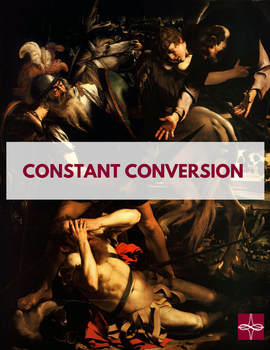 The story of St. Paul has always been one that has touched me to my very core. To think that someone who was persecuting the Church—who saw to it that the very first martyr, Stephen, was stoned to death—would eventually leave everything to follow God’s will for his life is truly extraordinary. But the story of St. Paul, although extraordinary, is not something beyond our reach. Some of us have experienced massive conversions in our lives—whether they involve entering the Church for the first time or returning to the sacraments after a time away. Some of us have had conversions of mind and heart when it comes to embracing what the Church teaches in regards to morality. Still others experience ongoing, undramatic conversion throughout their lives. Regardless of our individual experiences, the conversion of St. Paul can inspire us to encounter Christ in a deeper way that leaves us transformed. The Church does not celebrate the feast of the conversion of St. Paul merely for that moment of initial encounter and conversion. We celebrate it because of how it changed absolutely everything for Saul, now Paul. Paul met Christ personally; and this encounter guided his decisions and actions for the rest of his life. And so it must be with us! Shortly after Paul’s conversion on the road to Damascus, Acts 9:18 describes how after a conversation with Ananias, “things like scales fell from his eyes.” It was only after this that Paul was able to go and preach the good news of the Gospel—the good news that changed everything for him. Although we may not be knocked blind by a voice in the heavens, most of us do have scales on our eyes that prevent us from truly seeing and knowing Christ and spreading the Gospel. Whether we experience scales of sin, shame, bitterness, or inadequacy, we must remember that God desires constant conversion for us. Just as He so faithfully spoke to Paul in his conversion, He is inviting us to the same thing—the promise that a life turned toward Him will be better than anything our clouded eyes could imagine. This will manifest itself in our lives in any number of ways—through reconciliation in a relationship, returning to confession, or an increased disposition of mercy for those in our lives who need it. By allowing our lives to be constantly converted, we will be equipped, encouraged, and enabled to share the news that changed everything for Paul 2000 years ago and that continues to change everything for us now. Let us pray and ask the Lord for a deeper encounter with him. May he continually remove the scales from our eyes. St. Paul, pray for us! Questions for Reflection: Have you experienced a powerful moment of conversion or has your spiritual life been one of ongoing, gradual conversion? What might be some “scales” in your life that prevent you from living as a missionary disciple? When my husband and I were preparing for marriage, we spent time in reflection and prayer carefully choosing our Mass readings. It was such an exciting decision to make, and we prayed that the readings would reflect and inspire us in our marriage and all whom we would witness to by our marriage. Some of these same readings will be read at Masses across the world on the upcoming feast of the Holy Family, serving as a reminder of how we can live as reflections of the Holy Family in our daily lives. In the second reading, Paul tells the Colossians, “Put on, as God's chosen ones, holy and beloved, heartfelt compassion, kindness, humility, gentleness, and patience” (Col 3:12). Just like Mary, Joseph, and Jesus, we are God’s beloved, chosen and loved by God, and with that, we are called to live by these same virtues that Paul shares with the Colossians. The stories of Mary and Joseph consistently show us their lives of humility and gentleness. I think of Mary’s fiat (Luke 1:38), Joseph’s obedience to the angel of the Lord (Matthew 1:24), or how Mary and Joseph took Jesus to be presented in the temple in this weekend’s Gospel (Luke 2:22-40). Just like Mary and Joseph, we are called to serve and love God with faithfulness that is radical, but gentle and sweet. What does this faithfulness look like? For the Holy Family, not only did it manifest in the stories we read about in Scripture, but also in the mundane moments of the every day. Mary nursed Jesus as an infant, Joseph taught him carpentry, and Jesus served his parents and brought them joy! Jesus carried this love in his ministry that nurtured all to whom he preached, and it continues to carry on in the legacy of the Church. These little acts of faithfulness yielded enormous fruits and carried the Holy Family through times of immense suffering. As I feel overwhelmed with my day to day duties of family life as a wife and mother, or my job as a teacher, I find comfort in knowing that perhaps Mary and Joseph felt these demands, too. They were faithful to their vocations, to each other, and to the Lord. Life is a balancing act, but with “Christ dwell[ing] in you richly,” like the Holy Family, all can be done in love, “do[ing] everything in the name of the Lord Jesus” (Col 3:17). You show faithfulness when you do the dishes, when you submit an assignment for work or school, when you make the bed. You show faithfulness when you play with your children, when you have coffee with a friend, when you stop and pray. You show faithfulness when you show up to Mass. Opportunities for faithfulness, humility, and gentleness are in the every day, both big and small. Through these opportunities for faithfulness I have learned that God is never outdone in generosity. He wants to bless us and let us know His love, and He does this in the most profound way when we show Him our faithfulness and love, just as the Holy Family has modeled for us. As we continue to navigate the demands of our daily lives, let us cling to the intercession of the Holy Family, that we may be gentle and humble, showing radical faithfulness in all that we do. Question for Reflection: What are some opportunities to show for faithfulness in your life? For more resources on Marriage and Family, click here. Alyce Shields is a teacher in Washington D.C.
St. Paul offers us this challenge: “Be filled with the Spirit . . . giving thanks to God the Father at all times and for everything in the name of our Lord Jesus Christ” (Eph. 5:20) (emphasis added). Be thankful “at all times” and for “everything?” “Well that would seem to include suffering and evil. Really Lord – you want me to be thankful for that trial in my life? I'll be thankful for other things but not for that. That's impossible! Lord, at the very least, maybe you could tell me a little bit more about how I can live this radical gratitude? Help my unbelief!” This is how my prayer dialogue went with God one day as I examined my attitude toward gratitude. I thought to myself, “Do I treat gratitude as just one of those nice pious sentiments that I should do in general, but ignore when it costs me? In other words, do I make gratitude just a platitude?” I know I have treated gratitude in that way and have brushed off the Christian teaching to be thankful 'at all times' as idealistic on more than one occasion. I began to examine my soul more in depth. Why do I do this? “Usually,” I concluded, “it is because of a lack of knowledge as to why something is good for me and because my thoughts are too limited on the topic.” But God wants to break open our limited thoughts and actions. So I pressed on in my search for a deeper meaning of gratitude. Here is what I discovered. I read a book recently that changed my perspective on gratitude. The author explained that gratitude is not just a good practice to do occasionally to uplift our spiritual lives, but is actually a necessary law of every Christian spiritual life. Gratitude is not an option; it is something we have to practice regardless of temperament, disposition, or circumstance. Based on my reading, I came up with two patterns for our spiritual life: the “cycle of spiritual fruitfulness” and the “cycle of spiritual emptiness”. The cycle of spiritual fruitfulness begins with trust in God, which is nourished through faithfulness to one’s prayer life. Through prayer, gratitude grows. Gratitude is being aware of God’s many gifts in the daily happenings of our lives. Gratitude then becomes a necessary part of trust, especially in the midst of our suffering because gratitude opens up our heart to God. As we see more of God in our lives, then we give more to God and in turn are better able to receive more of God's love and grace in our life. This cycle, which begins with trust and gratitude, then repeats as we grow in love and become more loving gradually. This can be boiled down to: Trust through Prayer → Gratitude → Opens Heart → More Love The cycle of spiritual emptiness begins with a lack of trust in God and a lack of faithfulness to one's prayer life. Negativity focused on our weaknesses, what we lack, and our suffering replaces gratitude, closing our hearts and making us less capable of receiving God's love. We may even sin, like Adam and Eve in the Garden of Eden, whose ingratitude ultimately led to the first sin (Genesis 3). If we let this endure too long, then our whole life can become one big storm of sadness and anger. This can be boiled down to: Distrust through Not Praying→ Negativity → Closed Heart → Less Love Radical Gratitude Reconsidered The cycle of spiritual fruitfulness offers us several good reasons for why St. Paul instructs us to be grateful at all times and for everything with no exception. If I want to open up my heart more to the Lord and thereby love more, then I must find a way to be thankful - even for the most difficult suffering. Thankfulness is not an option reserved only for those who describe themselves as sanguine or optimists; thankfulness is a necessary part of holiness. It is therefore no coincidence that the highest Sacrament in the Church, the Eucharist, in Greek literally means “thanksgiving, gratitude.” With this in mind, I went back to my dialogue with God. I asked God for the grace to be more grateful in my daily life for everything. God, in turn, has asked me when I am tempted to be ungrateful and negative to make an act of trust in the moment and find something to be grateful for – health, the fresh crisp autumn air perhaps, or even more profoundly – my daily Sacrament with my wonderful wife – and thereby to become more aware of His love in my life. Slowly then, I become a little more grateful and a little less negative. Eventually I hope to build a habit of radical gratitude for every occasion in my life. This gratefulness does not come overnight and does not necessitate a formal act of thankfulness at every moment. As I become more grateful in those little moments, I will not only be able to resist ingratitude in the more difficult moments, but will also be better able to be grateful even for new sufferings. In this way, I am trying slowly to become thankful at all times by committing to a few acts of trust each day through gratitude. Radical gratitude is possible, but only through God’s wonderful grace! Through grace, I have come to learn the importance of radical gratitude and the cycle of spiritual fruitfulness. I choose the cycle of spiritual fruitfulness. What cycle are you on? Come Holy Spirit, make all of us more radically grateful! Besides receiving and visiting Our Lord in the Blessed Sacrament at Mass and Adoration, I find that the most nourishing aspect of my spiritual life is friendship with the saints. The Church holds celebrating the saints and asking for their intercession in high regard, as the Solemnity of All Saints, which falls on November 1st each year, is a holy day of obligation. The Vigil of All Saints, then, falls on October 31st each year. One goal of the Christian is to engage in prayer with God, and prayer, simply put, is conversing with God. Each day, we can offer our work to God and talk to Him frequently. This is not always easy, though, and I have found that friendship with the saints helps immensely. A friendship, which is the mutual willing of the good between people, is cultivated with communication and time spent together. Aristotle and Shakespeare, in their genius commentaries on friendship, always return to the simplicity of authentic friendship. Developing a friendship with the saints does not need to be overly-complex. It can also be founded upon communication and time spent together, ultimately bringing us closer to God and strengthening our communication with Him. Communicating daily with the saints further orients our minds to the supernatural, to the existence of the “things…invisible” that we recite in the Creed, and it also strengthens us in the fight for our souls. By communicating with the saints, we will become more like the saints, who in their devotion to Christ became like Christ. Thus, the saints will help us to become more Christ-like. The poet Gerard Manley Hopkins gets at this point in one of his poems: I say móre: the just man justices; Keeps grace: thát keeps all his goings graces; Acts in God's eye what in God's eye he is -- Chríst — for Christ plays in ten thousand places, Lovely in limbs, and lovely in eyes not his To the Father through the features of men's faces. The “just man” is the saint, and the saint’s Christ-like actions help him to become like Christ. As I mentioned in my last blog, stories of the saints are dramas of the highest caliber. Each saint had a unique personality and found their way to heaven in their own special, grace-filled way. There are so many saints that everyone can find someone they relate to or want to emulate. Below, I have listed just a few of my friends, and I pray that they will intercede for you! Sts. Peter and Paul, St. Edmund Campion, St. Ignatius, St. John the Beloved Disciple, St. Luke, St. Catherine of Sienna, St. John Paul II, Bl. Pier Giorgio Frassati, Bl. John Henry Newman, Sts. Thomas More and John Fisher, St. Robert Southwell, St. Henry Walpole, St. Aloysius Gonzaga, St. Robert Bellarmine, St. John Berchmans, St. Francis Xavier, St. Leo the Great, St. Augustine, St. Vincent Pallotti, St. Thomas Aquinas, St. Therese of Lisieux, St. Teresa of Avila, St. Josemaria Escriva, St. John Vianney, St. Joseph, Guardian Angels, Our Lady… Ora pro nobis! |
Details
Archives
April 2024
Categories
All
|
About |
Media |
© COPYRIGHT 2024 | ALL RIGHTS RESERVED



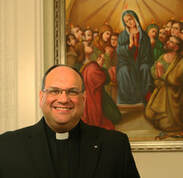
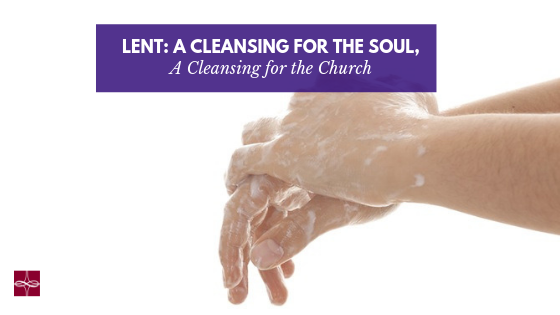

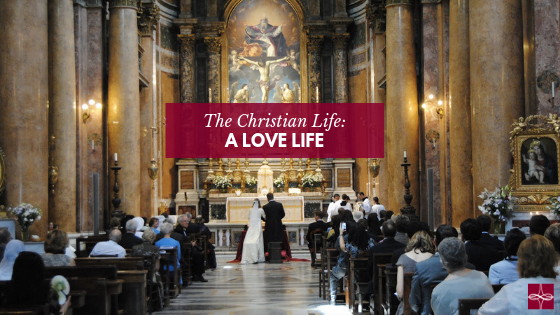

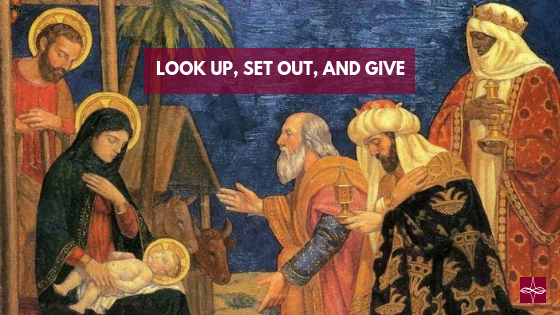



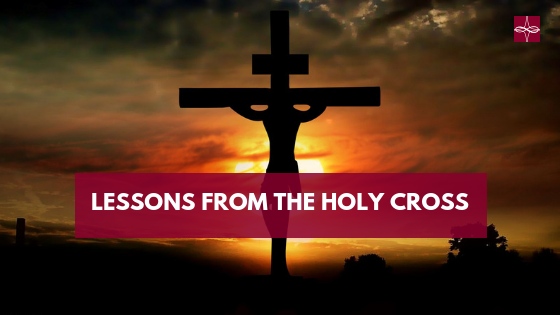
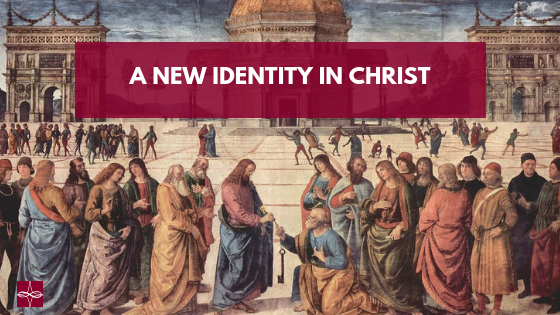

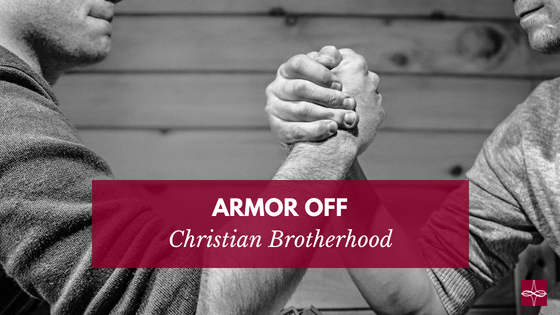



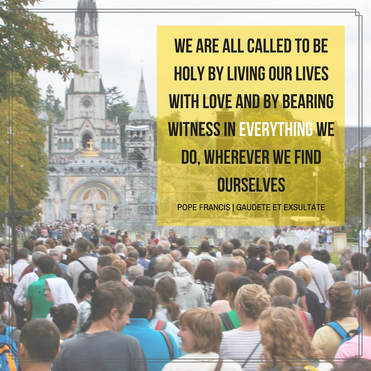
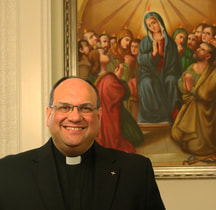

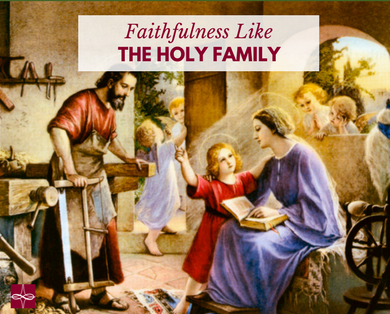




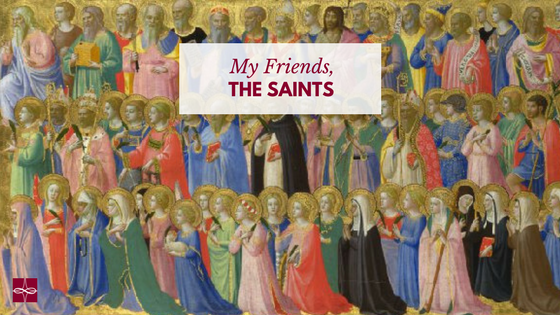

 RSS Feed
RSS Feed